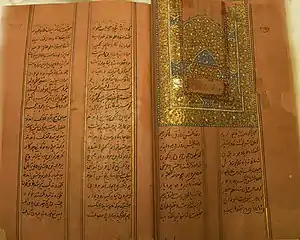Battle of Chamkaur
The Battle of Chamkaur, also known as Battle of Chamkaur Sahib, was a battle fought between the Khalsa, led by Guru Gobind Singh, and the coalition forces of the Mughals led by Wazir Khan. Guru Gobind Singh makes a reference to this battle in his victory letter Zafarnama.
| Battle of Chamkaur | |||||||
|---|---|---|---|---|---|---|---|
| Part of Mughal-Sikh Wars | |||||||
| |||||||
| Belligerents | |||||||
|
|
| ||||||
| Commanders and leaders | |||||||
|
| ||||||
| Strength | |||||||
| Unknown, but much larger[6] (Gobind Singh's Zafarnama metaphorically states that the Mughal soldiers numbered 1 million) | 48 | ||||||
| Casualties and losses | |||||||
|
| ||||||

Preamble to the battle
After Guru Gobind Singh left Anandpur Sahib on the night of December 5 and 6, 1704,[8] he crossed the Sarsa river with his disciples. While they were crossing, the mughals and hill chiefs attacked. Guru Gobind Singh and his followers asked permission of the city chief for shelter to rest for the night in their garhi or haveli. He refused, but his younger brother allowed the Sikhs to stay in the haveli.[2]
The battle
Despite giving assurance of safe conduct, the Mughal soldiers were looking for Guru Gobind Singh, to take his head as a trophy. After learning that the party of Sikhs had taken shelter in the haveli, they laid siege upon it. The actual battle is said to have taken place outside the haveli where Guru Gobind Singh was resting.[2] Negotiations broke down and the Sikh soldiers chose to engage the overwhelming Mughal forces, thus allowing their Guru to escape. Another Sikh who resembled the Guru, Sangat Singh, donned the Guru's clothes and remained with the soldiers. The next morning the remaining Sikhs were killed by Mughal forces.[9]
Aftermath
The Guru emphasized how he was proud that his sons had died fighting in battle, and that he had 'thousands of sons – the Singhs'. He also said that he would never trust Aurangzeb again due to his broken promises[10] and lies.
Zafarnama
Zafarnama or "Epistle of Victory" is a letter that was written by Guru Gobind Singh to the then Mughal Emperor Aurangzeb. Zafarnama vividly describes what happened at Chamkaur, and also holds Aurangzeb responsible for what occurred and promises he broke.
After his escape from Chamkaur, the exhausted Guru is said to have been carried by two Pathans (Ghani Khan and Nabi Khan) to Jatpur where he was received by the local Muslim chieftain. He later went to Dina, and stayed at mayi Desan ji house, where he is said to have written "Zafarnama" in Persian, in 111 verses.[10]
References
- Louis E. Fenech, The Sikh Zafar-namah of Guru Gobind Singh, (Oxford University Press, 2013), 66; "The Ẓafar-nāmah in this light assumes the form of an intriguing tautology: certainly the Guru was routed by Mughal forces at both Anandpur and Chamkaur; put bluntly, he and his Sikh were militarily defeated and left scattered."
- "Chamkaur Sahib". Encyclopaedia of Sikhism. Punjabi University Patiala. Retrieved December 28, 2020.
- Louis E. Fenech (2013). The Sikh Zafar-namah of Guru Gobind Singh: A Discursive Blade in the Heart of the Mughal Empire. Oxford University Press. p. 87. ISBN 978-0-19-993145-3.
- "Panj Pyare the Five Beloved of Sikh History – Guru Gobind Singh Creates the Original Panj Pyare of 1699". about.com. Retrieved April 27, 2012.
- Raj Pal Singh (2004). The Sikhs : Their Journey Of Five Hundred Years. Pentagon Press. p. 34. ISBN 978-8186505465.
- Singha, H. S (2000). The encyclopedia of Sikhism. Hemkunt Press. p. 31. ISBN 978-81-7010-301-1. Retrieved December 22, 2011.
- Dhillon, Dr Dalbir Singh (1988). Sikhism – Origin and Development. Atlantic Publishers and Distributors. p. 151. Archived from the original on 17 September 2016.
- Singha (2000, p. 43)
- Dogra, R. C.; Mansukhani, G. S. (1995). Encyclopaedia of Sikh Religion and Culture. Vikas Publishing House. p. 100. ISBN 0706983688.
- Singh, Guru Gobind. "Zafarnama stanza 45" (PDF). zafarnama.com. Retrieved September 24, 2013.
